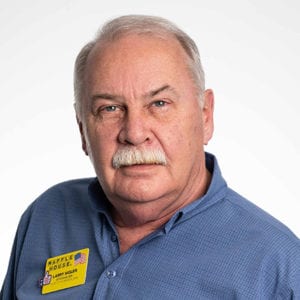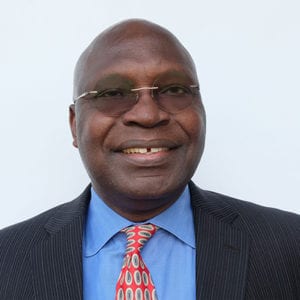3 Questions, 3 Answers with subject matter experts on relevant, trending topics.
Featuring Larry Sigler and Clement A. Saseun

Larry Sigler
Director of Food Safety for Waffle House, Inc.
Larry has spent 20 years working with Waffle House. In his current role he oversees development of training and general food safety preparedness. He also serves as a member of the corporate crisis team. In this capacity he works alongside health departments and emergency management teams to coordinate essential response activities.

Clement A. Saseun
Vice President of Quality and Technical Services for Haliburton International Foods
In his current role, Clement directs overall quality and food safety initiatives for the company. Clement has spent his career serving in food safety leadership positions including a previous role as Global Director of Quality Assurance and Supply Chain Management for Dine Equity, Inc. where he gained valuable insights to implementing and sustaining food safety on a global scale.
The COVID crisis has greatly affected the way we all interact and do business. What follows are some insights from food safety professionals about the impact the pandemic has had on our industry.
In this COVID-19 focused TripleTake Q&A – three questions, three answers with subject matter experts on relevant, trending topics – foodservice experts Larry Sigler (Waffle House, Inc.) and Clement Saseun (Haliburton International Foods) answer your most pressing questions on the impact of COVID and how to prepare for future outbreaks.
1. Being in public health and a champion for food safety, what would you say was your own “wake-up call” during this COVID crisis?
Larry Sigler: I believe my “wake-Up call” was how unprepared the world was for this situation. I hope through learning through this event we can be better prepared in the future when the next pandemic occurs. These types of situations have occurred in the past and the world taking the laissez-faire attitude that something like this could not happen again was unconscionable on everyone’s part.
Clement Saseun: As the effects of this pandemic were being felt around the world before it got to the United States, I just could not imagine a situation where the whole country can be completely shut down! With the love of ‘outside’ and restaurant eating and socializing, the realization that these activities ceased, and how much less robust our health and social systems are were my first wake-up call that this is a serious situation!
2. Given the massive impact of COVID-19, what are your thoughts for better health department continuity and consistency across the different levels of jurisdiction?
Larry Sigler: There was a total lack of continuity by the federal government and the states during this crisis. The key to solving issues like this is not to go helter-skelter from one solution to another but to work together to come up with sustainable solutions that will work. Shutting down the economy did nothing to contain the disease. The solution should have been to make face coverings mandatory early on, sanitation procedures that were consistent and viable, and social distancing enforcement.
Clement Saseun: Situations like COVID-19 must transcend politics. A bitter lesson from all of these is that we need to put more trust and reliance on our scientists and follow their lead in such situations. There is also a need for a coordinated strategy, based on science and facts to limit the damage such pandemics like this may bring in the future. The importance of our world quickly manifesting as a “global market,” with no one country having the monopoly of knowledge or all the answers is another big lesson. Communities of the world must be very nimble and willing to work together to stem the damaging effect of a virus or catastrophe like this.
3. How can operators be better prepared for future outbreaks like COVID?
Larry Sigler: Keep doing what we have been doing that works. We intend to maintain COVID levels of sanitation in all our restaurants going forward. We will also be looking at innovative ways to control social distancing and be ready for the next pandemic before it starts. We have been in the process of developing a pandemic playbook that we can use similarly to the storm playbook that we use for natural disasters. I believe our experience with natural disasters is what allowed us to get back in the game quickly and minimize our losses.
Clement Saseun: Face masks, social distancing, hand washing and so many other precautionary efforts that COVID-19 has imposed on us have to become our new normal. We cannot afford to stray too far away from all these, even when all the threat of COVID-19 has passed. Operators have to be adaptable and be flexible to take extraordinary steps that we may yet have thought of in the future to quickly adapt and effectively stop or slow down the spread of such outbreaks in the future.
Larry and Clement are members of the Sani Professional® Food Safety Advisory Council (SPFSAC). SPFSAC was established to bring together a peer group of food safety subject matter experts committed to sharing their expertise with the industry.
This snapshot from two highly accredited voices in the industry provides valuable insights: preparedness is essential for mitigating any crisis situation; and adaptability and compliance are paramount when the challenge is at our doorstep.
For more information and COVID-19 resources, visit the Sani Professional COVID-19 resource center.

